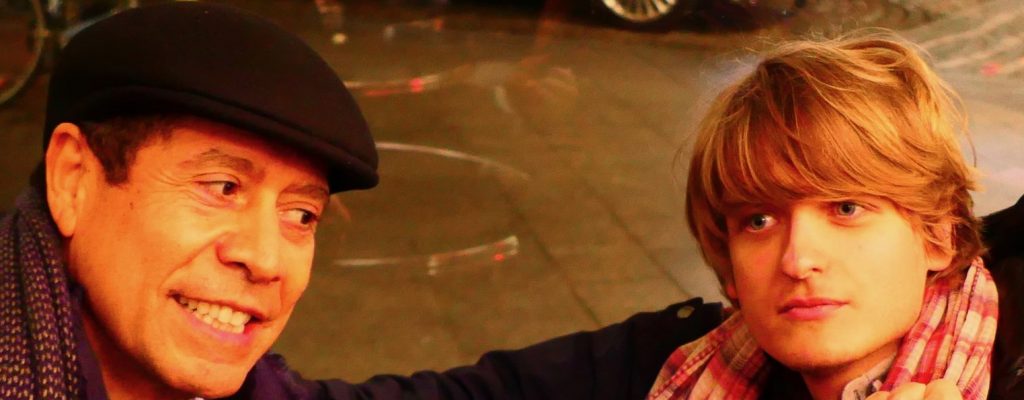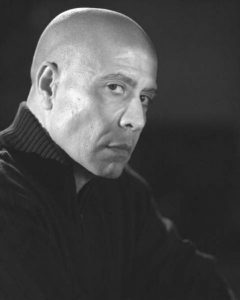 Kamel Krifa is an actor, film producer, and Hollywood’s stars trainer—including Jean-Claude Van Damme, Michelle Rodriguez, Eddie Griffin, Steven Seagal, and many other ones. Krifa ranks among Van Damme’s longstanding collaborators and personal friends, acting alongside him in various movies. This conversation with cultural journalist Grégoire Canlorbe first happened in Paris, in July 2017; it was resumed and validated in April 2020.
Kamel Krifa is an actor, film producer, and Hollywood’s stars trainer—including Jean-Claude Van Damme, Michelle Rodriguez, Eddie Griffin, Steven Seagal, and many other ones. Krifa ranks among Van Damme’s longstanding collaborators and personal friends, acting alongside him in various movies. This conversation with cultural journalist Grégoire Canlorbe first happened in Paris, in July 2017; it was resumed and validated in April 2020.
Grégoire Canlorbe: In Kickboxer IV, you have given flesh and soul to iconic villain Tong Po. Do you intend to return to the saga?
Kamel Krifa: At the time I had been offered a contract of five films to interpret the character of Tong Po. It was an interesting challenge, for my acting was essentially limited to the expression of my eyes and to working the articulation of the mouth. Indeed, I was asked to wear a mask, destined to give me oriental features. Alas, concerning fighting scenes, I did not have the opportunity to really prepare them thoroughly, because I had to avoid spoiling, through my respiration, the three hours of make-up that were devolved to me each day. (Knowing that an extra hour was still required to remove my make-up after filming.)
Finally, I will have only once lent my traits—or rather, lent my stature and my agility—to the deceitful and cruel Tong Po. But I effectively returned to the franchise Kickboxer, since I appear in Kickboxer: Retaliation, alongside Mike Tyson, Hafþór Júlíus Björnsson, Christophe Lambert, and none other than Jean-Claude Van Damme. The movie was released in January 2018. It is the sequel to Kickboxer: Vengeance, a remake of Kickboxer released twenty-seven years after the original film.

Grégoire Canlorbe: Jean-Claude Van Damme has directed a single film, The Quest, in which he plays in the company of the late Roger Moore. According to you, why did JCVD not want to repeat the experience since then?
Kamel Krifa: Jean-Claude has an undeniable talent as a director and he does not hesitate to advise the directors who work with him. They benefit from his experience, acquired both before and behind the camera. In turn, he offers them the best of himself in his acting. Since The Quest, he indeed prefers to delegate the task to the director and to focus on his interpretation. It allows him to let his mind float — instead of cornering his attention with a host of technical considerations that never leaves his mind in peace. In that way, he can prove fully invested, relaxed, and reactive under the eye of the camera; he can put himself in the skin of his character with an optimal ability to concentrate.
Also, entrusting the filmmaking to someone else, whom he knows qualified, and to whom he transmits his directives, allows him to take time for himself: time to commune with himself, and to read and meditate on subjects that are dear to his heart. Jean-Claude is not only a man of great culture; he is an authentic gifted, a superior intelligence, who carries a unique and insightful look at people, the things of life, and the universe.
Grégoire Canlorbe: Whether as his coach, his producer, or his on-screen partner, you have been working steadily and consistently with JCVD. Would you care to say a few words about it?
Kamel Krifa: I have known Jean-Claude since he was thirteen. When I met him, I was twenty years old; and from simple sports room colleagues, we quickly became best friends, spiritual brothers. In 1989, Jean-Claude, who had just acted in his launch pad Bloodsport (and who was about to become an international star with the tremendous successes of the early 1990s), proposed to me that I become his exclusive trainer; very honored, I accepted his offer. I then had the opportunity to act alongside him in Death Warrant and Lionheart—and that is how I became a Hollywood actor.

During the 1990s I continued to appear alongside Jean-Claude in various action movies; on the same token, I launched into production. That is how I was an associate producer for Double Impact, featuring Bolo Yeung. I also co-produced Legionnaire, for which I made location scouting in Morocco for two years. I must confess that I have a special affection for that period film, which deals with the Rif War and which features Abdelkrim Khattab, whom I had the good fortune to play. Most recently, I collaborated with Jean-Claude on the pilot of the TV series Jean-Claude Van Johnson, sponsored by Amazon—and, of course, on the last installment of the saga Kickboxer.
Grégoire Canlorbe: Let us talk about the origin of your cinematographic vocation. What could be, in particular, the “double impact” of your Tunisian childhood and of your early discovery of martial arts?
Kamel Krifa: At the age of seven I had stars in my eyes in front of peplums and other spy films from the 1960s; and it is to a large extent in the popular movie theaters of Tunis, where action movie left me mesmerized, that my vocation of actor was born. But it is also at home, from a very early age, by having fun shooting amateur films through a play of shadow and light, by imagining myself in the shoes of role models like Tarzan or Maciste, that my attraction for cinema took shape. The martial arts, which I have been practicing since my childhood, seemed to me early on to be the royal way to make my entry into the Hollywood milieu. As an adult my experiences in the army, the police, or as a bodyguard allowed me to perfect my combat skills.
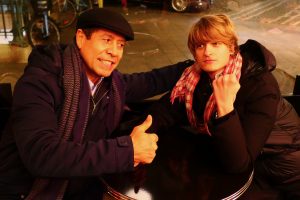
My childhood will have been very beautiful, bathed in a diverse and solidary environment, which was shared between Jews, Christians, and Muslims living in a fraternal understanding. I could not say if the fact of having spent my childhood in Tunisia, rather than in India or in Australia, made me more predisposed to those life choices. But Tunisia was most certainly a country with no future for me… while Europe was my springboard. At the age of 15 an internship in the hotel industry allowed me to leave my native land to settle in Germany. One year later I moved to Belgium—still within the framework of the hotel industry. After having worked in major, internationally renowned hotels and taken over the management of a Food and Beverage, I had the opportunity to take over a French gastronomy restaurant in Brussels, specialized in seafood.
Not content with getting acquainted with English (the mastery of which was indispensable to me if I wanted to break through in Hollywood), and traveling regularly to America, I continued my martial arts training assiduously. At the age of 36 I made the decision to move definitively to the United States. Around the same period Jean-Claude, then crowned with the halo of the success of Kickboxer, introduced me to producer Mark DiSalle, who insisted that I be in the casting of their next movie, Death Warrant—and the rest, you know it. Finally, I will have spent more time in my country of adoption, America, than in the country of my origins: the Tunisia that saw me born and taking my first steps—and that saw me discovering the martial arts and action movie, and swearing to set out to conquer Hollywood. Naturally, the fact of having had that Tunisian childhood sensitizes me to the social and economic development of my native country. As such, I have many projects in mind to give back to Tunisia its first place of open-air studios for foreign films: the place it has lost to Morocco.
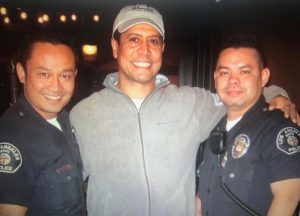
Grégoire Canlorbe: Your life course is rather iconoclastic. Do you believe that the law of attraction has something to do with your success?
Kamel Krifa: I am a grateful being. I believe in the law of attraction, of course! I believe what we have the ardent desire to obtain, if we work hard to have it, and if sincere and regular prayers accompany our efforts, then we end up getting it—for events miraculously work in our favor. Since my earliest childhood, I have seen myself in Hollywood, and I have been pious and laborious. What my mind dreamed of, the universe has realized it.
What are the ingredients of the law of attraction? Having faith in oneself and in one’s destiny; working hard every day that God does; expressing gratitude towards the Almighty for the favorable news that reach us, the rewards that our efforts reap; and also, respecting the others, showing generosity, helpfulness, and compassion. Be a good and charitable person, and what you have offered, the universe will render you a hundredfold! There is a precept of Islam, zakat, which asks the wealthy Muslim to give 10% of his wealth. The Good Lord rewards everyone according to his beneficence: he who has little given will be little recompensed by life; he who has offered much will see his desires fulfilled.
I am more than 65 years old [April 2020]; and yet I am thought to be in my fifties. Why? I take care of the body that God has offered me: it is the sanctuary of my faith. I train every day. I drank only occasionally, and always without excess; today I am no more drinking at all. I watch over my food like the apple of my eye; I avoid sodas just like polluted fish and meats poisoned with added sugar. But that is not all—I watch over the health of my soul and strive to be a good man. I pray—and I train—in my own way, each day that God makes, and always in respecting the rules; I pray on all occasions: in training like on my bike or in a meditation session. My physical health is not only the result of the care I take of my body; it is the reflection of the cleanliness of my soul. The martial arts have inculcated in me that integral discipline—the discipline of both body and soul—that Islam expects from the good Muslim. Ditto for a Catholic, a Jew, or a Buddhist — all religions converge in their teaching.
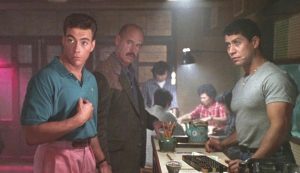
along with Jean-Claude Van Damme (on the left) and Geoffrey Lewis (in the middle)
Grégoire Canlorbe: It is not uncommon to point out—without condoning the bestial wars carried out on behalf of God or Allah—the allegedly heroic and ascetic ideal of Islam, which would contrast with the “consumerist apathy” of the allegedly atheist West. What are your thoughts on that subject?
Kamel Krifa: I am a spiritual believer, open to the world. When I am in Los Angeles, I go to the church with Jean-Claude Van Damme; when I am in Asia, I pray in a Buddhist temple. I pray as much in the mosque as in the synagogue. To me the word “Islam” means peace and respect. And whatever the religion envisaged, one obviously must be careful not to paint everyone with the same brush. Not all Muslims are terrorists or fanatics. For my part, I respect all religions, but I reject all fanaticisms—for I reject the fanaticism which finds itself in all religions.
As for the true ascetic, the true warrior, he is not the one who shoots an innocent crowd or who beats his wife. He is the one who has the spirit of competition, the taste for armed struggle or with bare hands, the rage of the conqueror; but who can restrain himself at the same time. He is the one who offsets his assertiveness and his passionate temperament with his generosity, his greatness of soul, and his sense of duty; the one who protects and avenges the weakest, and who devotes himself to work, to prayer, and to self-purification. A warrior makes war on all that can corrupt and disfigure his soul, be it debauchery, drunkenness, laziness, superficiality, or egoism. Islam properly understood does not call for perpetrating barbarous acts; it calls for putting into practice self-discipline and self-purification, in which lies the key to personal fulfillment. It also calls us to watch over our neighbor, whatever his religion may be.
Right now [April 2020] the coronavirus epidemic reminds us of the importance of discipline: being able to stay away from each other—and being able to wash one’s hands, one’s face. We wish good for our future; we pray for a happy future for the world, which is going through a difficult period with that virus without medication to treat it. Islam insists on the duty of cleanliness: routine and meticulous cleanliness. It also stresses the importance of praying, not only for oneself, but also and above all, for the whole world; the duty to pray (and to act) so that everyone be healthy and eat his fill. As such, I am currently dedicated to the distribution of protective masks—in the framework of an association that I have just created and which works closely with companies specializing in medical equipment. Your readers are welcome to write to me for more information.
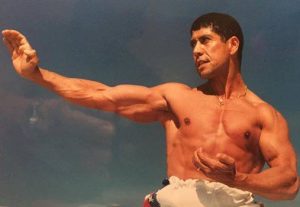
Grégoire Canlorbe: Do you see a same universal message common to Islam and to all other religions?
Kamel Krifa: Yes, namely the following one: we are all human and we all have the same god, the same creator. We all live under the same sun and in the same universe, the same house—and we are all passing through here below. The Prophet Muhammad enjoins us to watch over our neighbor, not to brutalize or enslave him. He enjoins us to respect him, to lend him assistance, and to consider him as our brother. He calls us to lead a probe, charitable, and fulfilled life; and to be at peace with ourselves, and to take care as much of our souls as of our bodies. What the Prophet Muhammad—in his own way and in his own language—states, all religions affirm so. Muslims respect all Prophets: Ibrahim, Moses, Jesus… They follow only the last of them, Muhammad, for he is the one who was announced to close and clarify their teachings. They believe the Koran because it contains things that are unexplainable for the sole reason; it surprisingly predicts the future.
The good Lord gave me good health (hence my gratitude); it gave me the power to hold on, the bliss of finding an opening, a loophole, at every obstacle in my way. For that reason I want to give humans and animals what life has offered me; I want to take care of my companions out of gratitude for Allah and out of love for others. The concern for watching over others pushed me, during all my life, to work seriously and to devote myself to cinema and coaching. I am a soldier. Today it is that same state of mind that has led me to launch my charitable foundation—Kamel Krifa Association—to take care of humanity and all the creatures that inhabit that universe. You surely know that Jean-Claude has animal welfare very much at heart. When I told him about the association I was setting up, he did not fail to say me, “Don’t forget the dogs!”
Grégoire Canlorbe: According to Mike Tyson, who plays alongside you in Kickboxer: Retaliation, a great man is not the one guarding himself from the people, but the one being accepted by the people. According to you, to which of those two categories of men does the current US President, Donald Trump, belong?
Kamel Krifa: Both Mike Tyson and Jean-Claude Van Damme have declared themselves publicly in favor of Donald Trump. For my part, I do not meddle in politics. Since we are talking about Mike Tyson, I would like to say that he is a person I admire: an authentic warrior. When one gets acquainted with the videos of his youth fights, easily found on YouTube, there is only one possible reaction: one is blown away. And also, Mike Tyson could find solace, a guide in the Muslim religion. Again, the asceticism preached by the Koran does not consist in mortifying oneself, or making oneself small. On the contrary, it is a discipline that allows one to give the best of oneself; to achieve the objectives that one gives oneself; to live up to one’s ambition—be it as a boxer, a practitioner of martial arts, an actor, a writer, a politician, a physician, an engineer, or even a businessman.

Grégoire Canlorbe: A furtive glance at contemporary film production allows us to notice that a white hero imbibing Asian values is often portrayed in American films and series. That form of soft power, which consists for the Asian culture to bleed onto the modern myths of the West, is manifestly unfamiliar to Russia. To my knowledge, at least, there is no movie where an American hero cottons onto Orthodox-Slavic values. How do you explain it?
Kamel Krifa: Your question is interesting. The attraction of the American action movie for Asia seems to me to be, to a large extent, linked to the mystical aura surrounding the Asian martial arts. Indeed, Russians may well have Systema and Israelis may well have Krav Maga, Asia is clearly the unassailable homeland of martial arts. For Asians, the martial arts are much more than a discipline; they are a religion and a philosophy by themselves. For the adepts of martial arts, all nationalities and all confessions considered, Asia therefore means the equivalent of Mecca. Russia simply cannot compete with the appeal of Asian culture in that area.
Grégoire Canlorbe: Thank you for your time. Would you like to add a thing or two?
Kamel Krifa: From outings of all kinds to the previews of the movies of Jean-Claude, Paris is a city where I have many memories. You know, when I started helping Jean-Claude, he was not an international star at all. I fought without respite for him: to put on his way financiers, advertisers, and journalists capable of propelling him. I did it for a brother, never asking for anything in return; and without ever allowing me to judge him for his excesses with drugs or alcohol. Because who am I to judge my neighbor? God alone is in a position to judge what we do with our existence on that planet. But I am very happy that Jean-Claude, whom I tried to rescue in that long fight also, ended up overcoming his addictions. I prayed to the good Lord that he cast off his demons; and today Jean-Claude is perfectly clean.
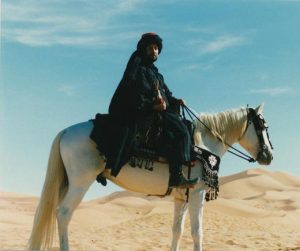
— Legionnaire
The most important thing in the life of an actor—Van Damme, Schwarzenegger, Stallone—is not his image, his roles on the screen; it is what he does with his life, it is the good he manages to do around him in his life. I always told Jean-Claude that in my eyes, the ultimate goal of our ascent into the cinema, the ultimate dream, was to assist the weakest and the most disadvantaged. I find myself in the perfect moment of my life to remember it. More than ever, I wish to do for my neighbor what I have done for Jean-Claude over all those years: helping people in all areas where I have expertise. More than ever, because I believe in the brotherhood of all men (without distinction as to color or religion), I wish to take action in the fight against poverty, mistreatment, pollution, and war; in a word, to work towards the unity of the world. That is the horizon of my association, which will include an academy for martial arts and a production house for films from all over the world—as much the United States, for example, as Africa, Europe, or China. More than ever, I wish to work in positivity, generosity, love, and the awareness of all those things: to be aware, as Jean-Claude puts it so well.
You can reach Kamel on his email address: krifaster@gmail.com
You can follow him on Facebook: https://www.facebook.com/kamel.krifa
Or on Instagram: https://www.instagram.com/therealkamelkrifa/
That conversation was initially published in The Postil Magazine, in their June 2020’s issue
